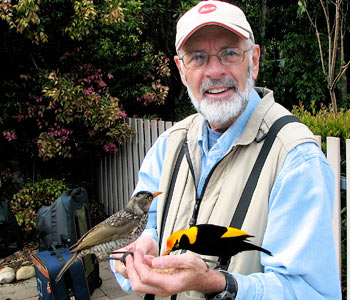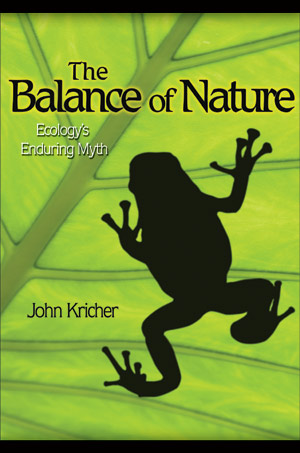
The existence of a balance of nature has been a dominant part of Western philosophy since before Aristotle. But the science of ecology and evolutionary biology together demonstrate that there is no balance of nature—not today and not at anytime in Earth’s long history. The paradigm is based on belief, not data; it has no scientific merit.
The Balance of Nature traces how and why the balance of nature assumption remained prevalent in the public mind and in ecological research until quite recently. By presenting a brief overview of the history of ecology and evolutionary biology, I show how ecologists now understand that the balance of nature was really a perception rather than a fact.
Nature is constantly in flux varying in scales of space and time, and most of that flux is due entirely to natural causes. At this time of extraordinary human influence on Earth’s ecosystems and biota, I argue that it is essential for humanity to understand how evolution occurs and why ecology is far more dynamic than static.
With that information it will then be hopefully possible to formulate policies of ecological ethics that will help humanity act as responsible stewards of the planet—even in a time of climate change and loss of natural ecosystems.
I conclude with what I believe to be a tightly reasoned appeal to adopt a materialistically based, scientific view of nature and, from that understanding, move toward sound decisions about how best to ensure the continued health of the planet’s ecosystems.
“Any form of balance of nature is purely a human construct, not something that is empirically real.”
I actually began thinking about this book about two decades ago. I teach at a liberal arts college and I have had numerous fruitful interactions ranging from casual conversations with professors outside of my discipline to interdisciplinary course collaborations.
For example, I once taught a course with a philosophy professor on Evolution and Ethics. This got me to read extensively about such things as the naturalistic fallacy, for example. Right now I have a formal connection between my introductory course on Evolution and Ecology and a course taught by a professor of English, called “Empire, Race, and the Victorians.” The connection focuses on Darwin’s views of race.
So, with my generalist background in the liberal arts, I am drawn to make connections with other disciplines. The Balance of Nature attempts to do that by historically tracing the likely origin and propagation of the notion of balance of nature. The idea of a balance of nature was never based one jot on science but on teleological notions of how things “ought” to be. One might almost count it among the multiple creation myths that characterize various human cultures.
I have always taught both a basic ecology course and various levels of evolution courses. When I initially approached ecology and evolution, as separate courses, the subject matter in each seemed fairly distinct from the other. I soon realized that distinction was false, a matter of scale. Evolution is ecology on a longer time scale. Ecology is vacuous without contextualizing it within evolution.
Back in the mid-1970s I thought of putting together a book of readings for ecology students that dealt with how evolution could inform ecology more directly than how it was represented in the dominant textbooks of the time. No publisher was interested.
When Ed Wilson published his sweeping book on Sociobiology in 1975 I felt as though ecology would be forced to embrace evolution in a manner similar to how Wilson brought animal social behavior into such a clear evolutionary light. Wilson’s book stirred controversy, because humans were included as though human social behavior evolved. Of course human social behavior evolves! But such a claim was anathema to many in academe at the time.
Meanwhile, ecologists did focus increasingly on evolution, and that was reflected in ecology texts. They began to apply more and more stochasticity to their analyses of ecosystem function, in particular to the analysis of the distribution of species within ecosystems.
I quickly realized that ecologists were moving away from equilibrium models. I realized as well that if there is little or no equilibrium attained in nature, there is no balance of nature, and that the term itself is misleading and meaningless.
I knew that the information ecologists were generating had broad implications for how the general public would perceive what it calls nature. As I did when conceiving another book, A Neotropical Companion, which is a broad overview of ecology of the American tropics, I thought that I could bring together an array of diverse information, all based on real science, that would synthesize into a cohesive volume. That’s how The Balance of Nature got started.
Of my various publications, this is the work that is most meaningful to me; the book is my synthesis of what I believe ecology to be, and why it is essential that ecology be more widely understood outside of the immediate field.
I wrote The Balance of Nature also as a personal account; I discuss actual events in my ecological life that influenced me with regard to the various topics in the book.
The second chapter, for example, is “Of What Purpose Are Mosquitoes.” Even to a casual browser this chapter would provide the flavor and essence of where I take the reader on this journey.
I begin by recounting an event that happened to me early in my career when I was shouted down at a local town meeting because I advocated that the town not spray for mosquitoes. The issue was eastern equine encephalitis (EEE) and my position was based on the fact that EEE had not been shown to be present in local mosquitoes that summer. I said that spraying would just select for more resistant mosquitoes and thus create a larger problem if EEE ever did show up in the population. One woman rose and shouted at me, asking if I wanted “to kill her baby.”
I start here to develop the notion that mosquitoes are part of nature; though they are important and abundant members of many ecological communities, like all of nature, mosquitoes merely exist, without purpose. I use mosquitoes to introduce the distinction between purpose and function, between teleology and organic evolution, to show that nature is not balanced, and to introduce the topic of ethical choices regarding the environment.
Another good browse is a chapter called “A Visit to Bodie.” Bodie is a ghost town in eastern California, in the Great Basin Desert. I went there some years ago with my family and, in a run-down building in this historic old town, I found a sign saying “nothing endures but change.” That is a quote from the Greek philosopher Heraclitus. This inspired the chapter.
I use Bodie as a starting point for exploring ecological perspective in space and time. I try, as I do throughout the book, to show the reader that any form of balance of nature is purely a human construct, not something that is empirically real. Ecosystems are always in some state of dynamics, sometimes very obviously so, sometimes not. An analogy can be drawn with watching the second and hour hands on a clock. Both hands move, but you can only detect movement in the second hand. Stare at the hour hand all you want: it never seems to move, though it obviously does. Ecosystem change ranges from “watching the second hand” to “watching the hour hand,” depending on what sort of change is occurring.
Finally, most readers will likely seek something of a “bottom line.” My final chapter, “Facing Marley’s Ghost,” would provide that. I use the analogy from “A Christmas Carol” to impress on the reader that although there is no balance of nature as such, there is much about nature with which to be concerned.
We humans, like Scrooge’s partner Marley, are in effect “forging a chain” of a sort. In this case the chain reflects our need to move more forcefully in the direction of environmental ethics. Doing so will help assure the continuation of ecosystem services that we depend upon, whether we know it or not, and will help us deal meaningfully with the reduction in biodiversity evident today.
In the last chapter I also include examples of how ecology and economics may unify toward a more sound use of environmental resources and how such a unification can translate into a change in paradigm regarding how humans view nature.
“Ecology and economics may unify toward a more sound use of environmental resources.”
The significance of realizing that the balance of nature is not a scientific concept (and is false) is potentially substantial. I hope to make my readers think about how ethics may expand to more fully encompass environmental parameters and, as such, advance the best interest of society.
I use as my foundation the reality of organic evolution and Darwinian natural selection to demonstrate that the concept of a balance of nature is and always has been false. I sharply separate evolution from teleology and explain why balance of nature is fundamentally teleological.
I argue that ecology, as a science, has no significant paradigms and is in reality a branch of evolutionary biology. Since believing in a balance of nature is deeply engrained in many people, especially those focused on conservation goals, my assertion likely will seem provocative and dubious.
That is why I wrote this book: to explain, in a brief and lucid style, why I believe the concept of balance of nature is philosophical baggage and should be discarded. You need a more realistic view of what nature is and isn’t.
There is a major issue that is ongoing today, that of biodiversity. Why preserve species? Because they are part of the balance of nature? Or because they are intrinsic to ecosystem function, balance or not? Or because they look compelling? Or because they have “rights” to existence? How does biodiversity function and why should humans, whose population and influence on Earth grows daily, care about biodiversity? If a reader of The Balance of Nature emerges with a greater grasp of these issues, I will have succeeded. It is a small but I believe a necessary step in the right direction.


John Kricher is the A. Howard Meneely Professor of Biology at Wheaton College, a Fellow in the American Ornithologists Union, and member of the Science Advisory Committee of the Council of the Massachusetts Audubon Society. He has previously served as president of the Association of Field Ornithologists, the Wilson Ornithological Society, and the Nuttall Ornithological Club, and as a member of the board of directors for the Manomet Center for Conservation Sciences, the New Jersey Audubon Society, and the American Birding Association. Dr. Kricher has conducted Earthwatch-sponsored research on migrant birds on their wintering grounds in Belize, and led numerous trips to places including Cape May, Block Island, coastal New England, Arizona, the Pacific Northwest, Belize, Guatemala, Costa Rica, Peru, Ecuador, Galapagos Islands, Panama, and Trinidad. He has authored over 100 papers and articles in scientific journals as well as magazines and newspapers. Besides The Balance of Nature, Kricher’s books include Galapagos: A Natural History (Smithsonian Institution 2002; paperback Princeton 2006), four titles in the Peterson series, of which A Neotropical Companion has been translated into Spanish through the American Birding Association. John and his wife, Martha Vaughan, divide their time between Pocasset, Massachusetts, on Cape Cod and Sunbury, Georgia.